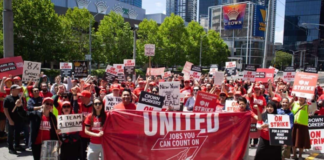Left Turn: Political Essays for the New Left
Edited by Antony Loewenstein and Jeff Sparrow
Melbourne University Publishing
$27.99
Left Turn, according to editors Antony Loewenstein and Jeff Sparrow, aims to, “argue for positions that don’t often get heard in Australian public life.” The book gives a welcome hearing to left-wing ideas on many of the central political issues of the moment, a refreshing change to most political commentary.
It’s worth getting your hands on a copy just to read the story of how the Aboriginal community at Wadeye fought for control of alcohol in their community in Chris Graham’s “Violence, Non-Violence and Aboriginal Australia”.
Pamela Curr’s essay, “Seduced by Panic”, is a reminder of how the mandatory detention regime under Labor is reproducing all the horrors of the Howard years (though unfortunately she frames her argument for a more humane policy around stopping people smuggling).
The new sexism
One of the best essays is Jacinda Woodhead’s “Sexiness and Sexism: Neoliberalism and Feminism”—a polemic directed at some of the weaknesses of contemporary feminism.
The 1970s women’s liberation movement fought to overthrow the stultifying taboos on women’s sexuality. But what’s presented as a liberated sexuality today is an awful caricature of a genuine sexual freedom. Woodhead describes it as, “participation in the construction of… sexual image via participation in the marketplace.”
Yet contemporary feminism, as her quote from Nina Power’s One Dimensional Woman says, is hampered in the fight against the new sexism by, “liberalism that enshrines personal choice as the baseline of political emancipation.” Too often that means celebrating the faux choices presented by the market about how we can look and live.
One only has to think about the pain so many women go through to make themselves fit the mould of feminine perfection (thin, straight, big-breasted, wrinkle-free… and the list goes on!) to realise how little choice is truly involved. Similarly, the common championing of women’s ability to climb the corporate ladder or get into parliament ignores the way women in positions of power facilitate the oppression of others, reflecting class inequality.
The Slut Walk demonstrations in Australia were a little burst of outrage at the resurgence in sexist ideas, and a culture where rape and sexual abuse are common place. They were “heartening”, Woodhead argues, yet unwilling to challenge broader questions of “the market and its interests”. Her argument for an active, campaigning focus on issues like the NT Intervention, abortion on demand and state-funded childcare is one of the book’s most convincing.
Rebuilding
Jeff Sparrow’s essay on the Occupy movement, and Greens Senator Lee Rhiannon’s on the future of the Greens are two others that attempt to look at how left-wing ideas can have an influence on Australian politics.

Sparrow defends the Occupy movement from right-wing critics, explaining the reason why Occupy so offended conservatives was because it dared demand a radical alternative to the alienating and hollow world of modern capitalism.
His argument that “Occupy matters because it provides a glimpse of how the left might revive” is welcome in the context of Rhiannon’s argument for a parliamentary strategy, and some of the other essays in Left Turn that bemoan the ignorance of ordinary people.
But as he quotes Zizek, “carnivals come cheap”. There were debates in Occupy about how to build beyond the romanticism of the city square occupations, and though Sparrow comes to these at the end of his piece, he unfortunately sidesteps offering his own views.
Occupy was crying out for a stronger left intervention that, among other things, argued to link up the movement with the power of organised workers. In Sydney, links were made with striking MUA dockers, who led one of the demonstrations, and with Qantas workers in their battle against Alan Joyce.
Similarly, though the movement had a radical anti-systemic quality, the rejection of demands was often a rejection of left politics. There was a real argument to be had about taking on causes and issues that could broaden Occupy’s support—like taxing the rich, ending mandatory detention, demanding green jobs. This could have provided some concrete focus beyond the encampments themselves, which very quickly became bogged down in maintaining themselves for their own sake (a very difficult task in the face of police intransigence).
The focus on struggle is missing from Lee Rhiannon’s essay. Rhiannon admits parliament’s conservatising influence, and argues, importantly, that The Greens must build themselves as a left-of-Labor party with policies that put the interests of working people at the forefront. That is refreshing when others in The Greens are pushing better relationships with business and farmers (witnessed in the preselection of former investment banker Peter Whish-Wilson in Bob Brown’s old Senate seat).
But her solution is effectively representing the membership better. Yet the power to advance the agenda Rhiannon and the left in The Greens envision doesn’t lie within the halls of parliament, nor simply within the ranks of the party, but in the wider struggles outside parliament.
While Rhiannon acknowledges the role of struggle, her vision of success is a parliamentary one. But it is the parliamentary focus that has dragged The Greens to the right and produced policies like the unpopular carbon tax. The Greens could drag politics to the left if they used their parliamentary weight to fan the flames of resistance.
Let’s hope that Left Turn stimulates these important debates amongst the wider left.
Amy Thomas





